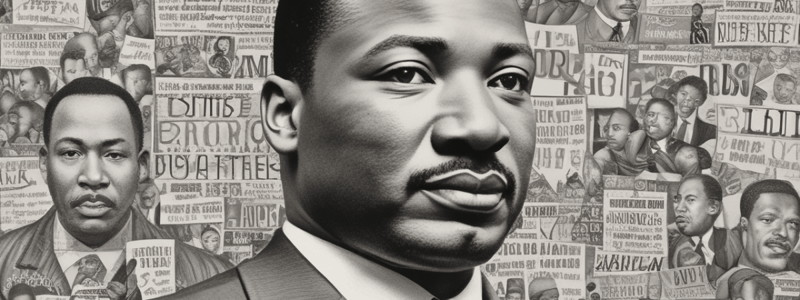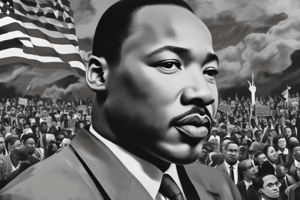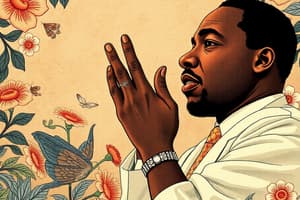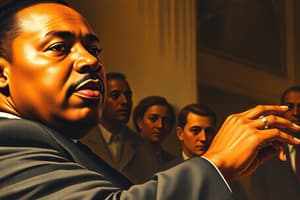Podcast
Questions and Answers
What was the main goal of the Southern Christian Leadership Conference (SCLC) founded by Martin Luther King Jr. in 1957?
What was the main goal of the Southern Christian Leadership Conference (SCLC) founded by Martin Luther King Jr. in 1957?
- To promote violence as a means of achieving social change
- To advocate for the rights of African Americans in the North
- To end segregation and discrimination through nonviolent protests (correct)
- To establish a new political party focused on racial equality
What was the primary inspiration for Martin Luther King Jr.'s philosophy of nonviolent resistance?
What was the primary inspiration for Martin Luther King Jr.'s philosophy of nonviolent resistance?
- The principles of the American Declaration of Independence
- The writings of Frederick Douglass
- The teachings of Jesus Christ
- The philosophy of Mahatma Gandhi (correct)
What was the main topic of Martin Luther King Jr.'s famous 'I Have a Dream' speech in 1963?
What was the main topic of Martin Luther King Jr.'s famous 'I Have a Dream' speech in 1963?
- His vision of a racially integrated and harmonious society (correct)
- The need for economic empowerment in the black community
- The importance of voting rights for African Americans
- The role of the church in the civil rights movement
What was the significance of the Montgomery Bus Boycott in 1955 for Martin Luther King Jr.?
What was the significance of the Montgomery Bus Boycott in 1955 for Martin Luther King Jr.?
What is the primary legacy of Martin Luther King Jr.'s work in American history?
What is the primary legacy of Martin Luther King Jr.'s work in American history?
What was the primary goal of the Civil Rights Act of 1964 and the Voting Rights Act of 1965?
What was the primary goal of the Civil Rights Act of 1964 and the Voting Rights Act of 1965?
What was the main message of MLK's 'I Have a Dream' speech?
What was the main message of MLK's 'I Have a Dream' speech?
What was MLK's approach to combating racism in America?
What was MLK's approach to combating racism in America?
What was the broader vision of MLK's activism beyond racial equality?
What was the broader vision of MLK's activism beyond racial equality?
What is a testament to MLK's commitment to creating a more inclusive and harmonious society?
What is a testament to MLK's commitment to creating a more inclusive and harmonious society?
Flashcards are hidden until you start studying
Study Notes
The Legacy of Martin Luther King Jr.'s "I Have a Dream" Speech
Martin Luther King Jr. (MLK) is remembered as a significant figure in American history, who dedicated his life to promoting civil rights, equality, and justice for all. His vision of a country where people would be judged by the content of their character, not by the color of their skin, has left an indelible impact on the nation.
Civil Rights Movement and Nonviolent Resistance
MLK emerged as a prominent leader in the civil rights movement, especially during the Montgomery Bus Boycott in 1955. He advocated for nonviolent resistance, inspired by Mahatma Gandhi's philosophy. MLK believed that peaceful means could be used to achieve social change. He co-founded the Southern Christian Leadership Conference (SCLC) in 1957, which aimed to end segregation and discrimination through nonviolent protests.
Leadership and Activism
MLK's leadership in the civil rights movement was instrumental in shaping the course of American history. He delivered his famous "I Have a Dream" speech during the March on Washington for Jobs and Freedom in 1963. In this speech, MLK spoke about his vision of a racially integrated and harmonious society. He also played a crucial role in advocating for the passage of the Civil Rights Act of 1964 and the Voting Rights Act of 1965, which outlawed discrimination based on race, color, religion, sex, or national origin, and aimed to overcome legal barriers preventing African Americans from exercising their right to vote.
Racism in America
MLK's activism and speeches highlighted the issue of racism in America, which he considered to be an unspeakable horror. He advocated for peaceful means to combat this issue, such as nonviolent resistance and dialogue. MLK's "I Have a Dream" speech called for an end to racism and for people to be judged by their character, not their race.
American History and Nonviolent Struggle for Civil Rights
MLK's legacy extends beyond the civil rights movement. He expanded his focus to economic justice, advocating for fair wages and improved economic conditions for all Americans, regardless of race. MLK's philosophy of nonviolent resistance has been a source of inspiration for many activists, particularly in the Black Lives Matter movement.
In conclusion, MLK's "I Have a Dream" speech and his involvement in landmark legislations like the Civil Rights Act and Voting Rights Act are testament to his commitment to creating a more inclusive and harmonious society. His legacy extends beyond racial equality, encompassing a vision for economic justice and equality for all.
Studying That Suits You
Use AI to generate personalized quizzes and flashcards to suit your learning preferences.




